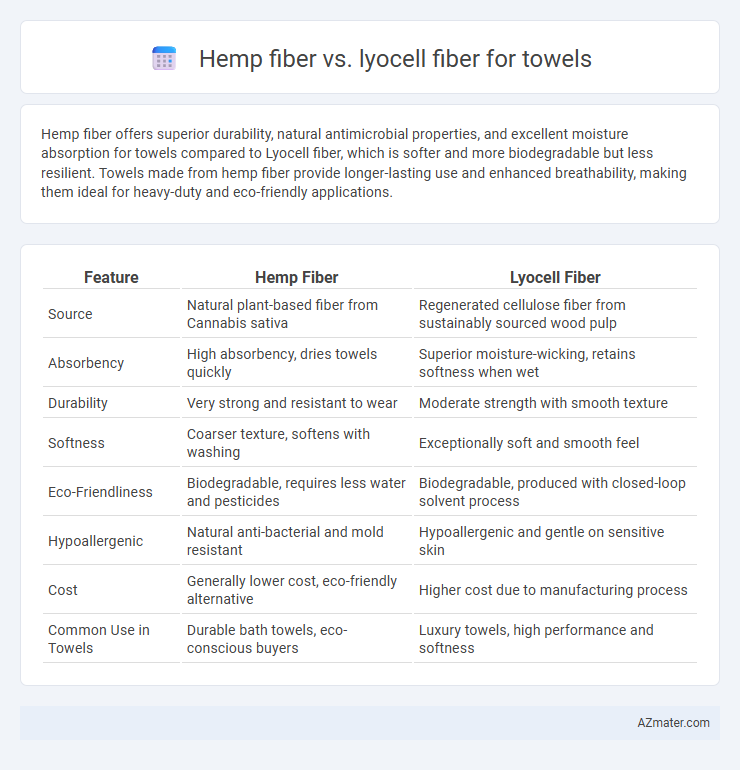Hemp fiber offers superior durability, natural antimicrobial properties, and excellent moisture absorption for towels compared to Lyocell fiber, which is softer and more biodegradable but less resilient. Towels made from hemp fiber provide longer-lasting use and enhanced breathability, making them ideal for heavy-duty and eco-friendly applications.
Table of Comparison
| Feature | Hemp Fiber | Lyocell Fiber |
|---|---|---|
| Source | Natural plant-based fiber from Cannabis sativa | Regenerated cellulose fiber from sustainably sourced wood pulp |
| Absorbency | High absorbency, dries towels quickly | Superior moisture-wicking, retains softness when wet |
| Durability | Very strong and resistant to wear | Moderate strength with smooth texture |
| Softness | Coarser texture, softens with washing | Exceptionally soft and smooth feel |
| Eco-Friendliness | Biodegradable, requires less water and pesticides | Biodegradable, produced with closed-loop solvent process |
| Hypoallergenic | Natural anti-bacterial and mold resistant | Hypoallergenic and gentle on sensitive skin |
| Cost | Generally lower cost, eco-friendly alternative | Higher cost due to manufacturing process |
| Common Use in Towels | Durable bath towels, eco-conscious buyers | Luxury towels, high performance and softness |
Introduction to Hemp and Lyocell Fibers
Hemp fiber, derived from the stalks of the Cannabis sativa plant, is renowned for its durability, natural antimicrobial properties, and high absorbency, making it an eco-friendly choice for towels. Lyocell fiber, produced from sustainably sourced wood pulp through a closed-loop process, offers exceptional softness, breathability, and moisture-wicking capabilities ideal for towel usage. Both fibers balance sustainability and performance, with hemp excelling in strength and longevity, while lyocell provides a smooth, gentle feel against the skin.
Sustainability: Hemp vs Lyocell
Hemp fiber boasts exceptional sustainability due to its rapid growth, low water requirements, and minimal pesticide use, making it an eco-friendly choice for towels. Lyocell fiber, produced from sustainably managed eucalyptus forests through a closed-loop solvent process, offers biodegradability and reduced environmental impact. When comparing sustainability, hemp's agricultural efficiency and carbon sequestration capacity often surpass lyocell's production benefits, positioning hemp as a leading sustainable textile option.
Fiber Production Processes
Hemp fiber is derived from the stalks of the Cannabis sativa plant through processes like retting, decortication, and mechanical extraction, which separate the bast fibers for durability and natural antimicrobial properties. Lyocell fiber production involves dissolving cellulose from wood pulp in a non-toxic solvent, followed by a closed-loop system that recycles chemicals, resulting in a soft, biodegradable fiber with high moisture absorption. The eco-friendly, chemical-intensive extraction of Lyocell contrasts with the more labor-intensive, renewable agricultural process used for hemp fibers, influencing sustainability and fabric texture in towel manufacturing.
Absorbency and Moisture Management
Hemp fiber offers exceptional absorbency with natural antimicrobial properties that enhance moisture management, making towels durable and resistant to odor buildup. Lyocell fiber excels in moisture-wicking capabilities, quickly drawing water away from the skin for a soft, breathable towel experience ideal for sensitive skin. Towels made from hemp provide long-lasting absorbency, while lyocell ensures rapid drying and smooth moisture control.
Softness and Skin Feel
Hemp fiber provides a textured, durable towel surface that softens with each wash, offering a natural, breathable feel ideal for sensitive skin. Lyocell fiber excels in softness and smoothness, delivering exceptional moisture absorption and a silky touch that enhances comfort for delicate or allergy-prone skin. Towels made from lyocell tend to retain their softness longer compared to hemp, which may start coarse but gains a uniquely cushioned feel over time.
Durability and Longevity
Hemp fiber offers superior durability and longevity for towels due to its strong, coarse fibers that resist wear and tear over time. Lyocell fiber, while softer and more absorbent, tends to have a shorter lifespan as it is more prone to pilling and weakening after multiple washes. For towels requiring long-term use and resistance to frequent laundering, hemp fiber provides a more resilient and lasting option.
Eco-Friendliness and Biodegradability
Hemp fiber is renowned for its eco-friendliness due to its low water usage, minimal pesticide requirement, and rapid growth, making it a sustainable choice for towels. Lyocell fiber, derived from sustainably sourced wood pulp and processed through a closed-loop system, also offers excellent biodegradability and reduced environmental impact. Both fibers decompose naturally, but hemp towels typically have a lower carbon footprint and greater soil regeneration benefits during cultivation.
Cost and Market Availability
Hemp fiber towels generally have higher initial costs due to more complex processing and lower scale of production, yet offer superior durability and eco-friendliness. Lyocell fiber towels are more cost-effective with widespread market availability, benefiting from large-scale manufacturing and consistent quality. Both fibers serve niche markets, but Lyocell dominates mainstream distribution channels while hemp continues gaining traction in sustainable product segments.
Allergies and Skin Sensitivities
Hemp fiber is naturally hypoallergenic and antimicrobial, making it an excellent choice for towels used by individuals with allergies or sensitive skin. Lyocell fiber, derived from sustainably sourced wood pulp, is also known for its softness, breathability, and low irritation potential, which helps minimize skin reactions. Both fibers offer eco-friendly benefits, but hemp's robust antibacterial properties provide added protection against allergens and microbes in towel applications.
Final Verdict: Which Fiber is Best for Towels?
Hemp fiber offers exceptional durability, natural antibacterial properties, and superior absorbency, making it an eco-friendly choice for towels that last longer and resist odors. Lyocell fiber, derived from sustainably processed wood pulp, provides a soft, silky texture with high moisture-wicking capabilities and biodegradability. For towels, hemp fiber is best suited for those seeking rugged longevity and environmental benefits, while lyocell excels in comfort and gentleness on the skin.

Infographic: Hemp fiber vs Lyocell fiber for Towel
 azmater.com
azmater.com